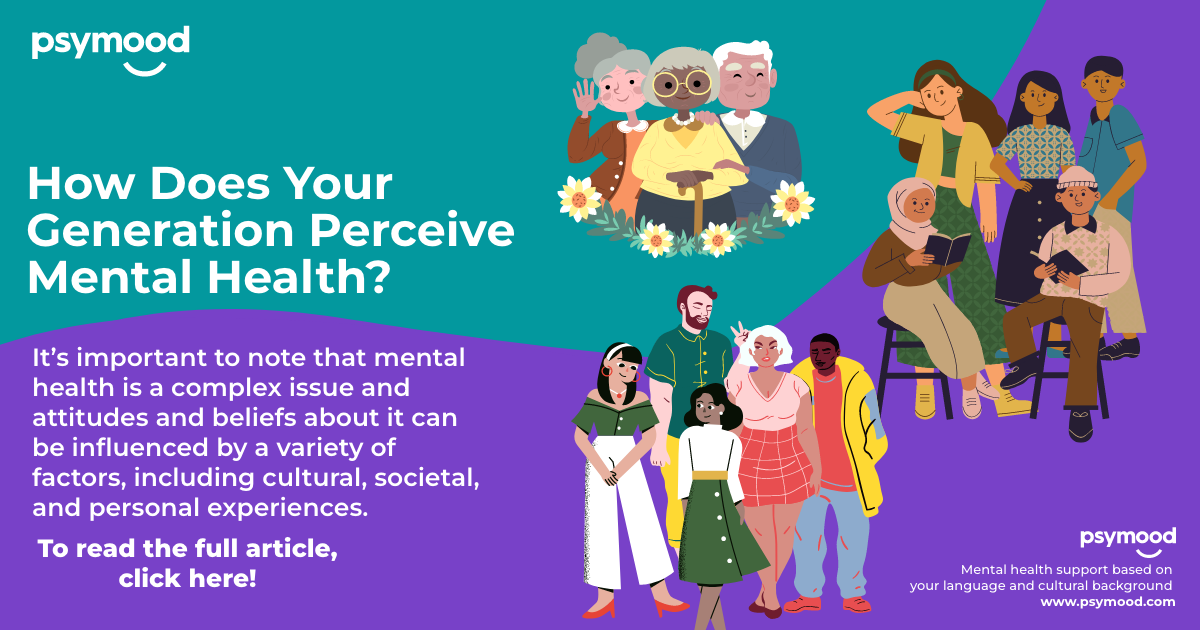Generations and Mental Health
Different generations may have different attitudes and beliefs when it comes to mental health. Older generations may have grown up in a time when mental health was not widely discussed or understood which may cause them to be less likely to seek help or talk openly about their mental health. Younger generations on the other side may have grown up in a more open and accepting society and may be more likely to seek help and talk openly about their mental health. It’s important to note that mental health is a complex issue and attitudes and beliefs about it can be influenced by a variety of factors, including cultural, societal, and personal experiences.
Gen Z and Mental Health
Generation Z, which is typically defined as those born between 1997 and 2012, tends to have a more open and accepting attitude toward mental health than previous generations. They have grown up in a time when mental health has become a more widely discussed and understood topic, and may be more likely to seek help and talk openly about their mental health. They have also been exposed to more information and resources about mental health through social media and other online platforms. Overall, while Generation Z may have a more positive and accepting attitude toward mental health, there is still work to be done in terms of breaking down stigmas and improving access to mental health services.
Millennials and Mental Health
Similar to Gen Z, millennials, who are typically defined as those born between 1981 and 1996, have also grown up in a time when mental health has become a more widely discussed and understood topic. They have been exposed to more information and resources about mental health through various channels such as social media, increased awareness campaigns and advocacy groups. Millennials were the first generation to have access to social media and were the pioneers of mental health awareness and acceptance through the use of social media.
However, like previous generations, millennials may still face stigmas and barriers surrounding mental health. They may also face unique challenges such as high levels of student loan debt, job insecurity, and the pressure to succeed in an increasingly competitive job market. These factors can contribute to increased stress and anxiety levels, and may make it more difficult for millennials to seek help or access mental health services.
In summary, while millennials may have a more positive and accepting attitude towards mental health than previous generations, there are still stigmas and barriers surrounding mental health that need to be addressed and unique challenges that may make it more difficult for them to access mental health services.
Older Generations and Mental Health
Older generations, such as Baby Boomers (born between 1946 and 1964) and the Silent Generation (born between 1928 and 1945), may have grown up in a time when mental health was not widely discussed or understood. They may have been raised with the belief that mental health issues were something to be ashamed of, or that they were a personal weakness. As a result, they may be less likely to seek help or talk openly about their mental health. Old generations also often regard mental health issues as taboo topics and not something that should be spoken about to others.
Moreover, older generations may have less access to mental health resources, as they may not be as familiar with online or community resources, or may have difficulty navigating the healthcare system.
However, it is important to note that these are generalizations and individuals within a generation can have different attitudes and beliefs about mental health. It’s also important to note that attitudes and beliefs about mental health have changed over time, and older generations may be more open to seeking help and discussing mental health now than they were in the past. Each person is different, and while some people who are part of the old generation may not be comfortable with speaking out about their mental health, there may be others who are and actively seek help with their mental health.
Final Thoughts
Overall, different generations may seek mental health help in different ways. For example:
Older generations may be more likely to seek help from a primary care physician or a religious leader and may be less likely to seek out specialized mental health services. While younger generations may be more likely to seek help from a mental health professional, such as a therapist or counsellor, and may also be more likely to use online resources, such as teletherapy or self-help apps. It is also worth noting that access to mental health resources, as well as cultural, societal, and personal factors, can influence how an individual or a generation seeks help.
Finally, breaking down stigmas is an ongoing process, and requires a multifaceted approach. It’s important to recognize that changing attitudes and beliefs about mental health takes time, effort, and continued education.
PsyMood is a digital tool designed to help you find the support you need in the language that you are most comfortable with. PsyMood considers cultural background, geographical location, interests, and personal needs, amongst other factors, to pair you with service providers for either online or in-person therapy sessions.


.png)
.png)
.png)
Recent Comments